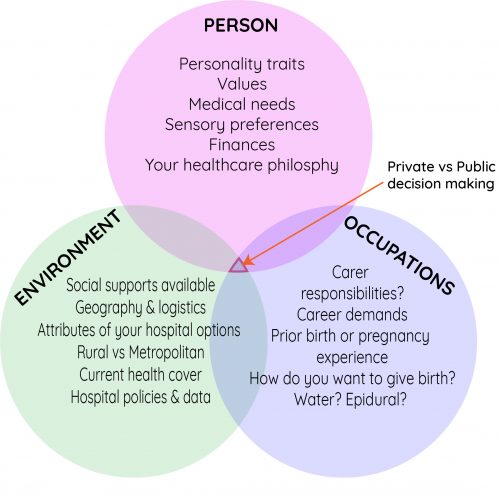Private versus public maternity care. It’s a debate that’s rife in pregnancy chat rooms. It provides great fodder in the ‘mummy wars’. But to me, there is no debate as no one can ‘win’. Each person has a unique set of circumstances that will determine whether private or public maternity care is best for them. Only their unique circumstances will determine what value they receive from their maternity choices.
Now first and foremost, let’s acknowledge that not everyone is in the position to choose whether they receive public or private care. For many, the cost of private healthcare and private health insurance is simply unattainable. For those who fall into that category, the good news is that in Australia, we have an excellent public health system. Yes, there are resourcing issues and there have been individual cases where the healthcare delivered was unacceptable, but overall if you are receiving public maternity care and having your baby in a public hospital in Australia, you are going to receive great care.
For those who have the option of choosing private or public maternity care, there are many factors you may wish to consider when deciding on which care pathway suits your individual circumstances and preferences. As an Occupational Therapist (OT) I support people to live life to the full by using a holistic perspective on their individual needs and goals. Making decisions on pregnancy, birth and parenting can be assisted by thinking about factors relating to:
- a) the person
- b) the environment – physical and social
- c) the occupations (also known as all the things we do to fill / occupy our time)

Law’s Person Environment Occupation (PEO) model illustrating public versus private maternity decision-making factors – when finances are not a limitation.
Below I elaborate on some of these factors so that you can reflect on whether they are relevant to your decision on choosing between public and private maternity care.
Financial Implications & Private Health Insurance:
Not all private health insurance policies are created equal and they don’t all contain maternity cover. If you are considering private care, you will need to check that you have adequate cover and that you have served the required waiting period. This is often 12 months but not always so speak directly with your health fund.
Contrary to popular belief, the cost of private maternity care is more than just the cost of your private health insurance. There can be a number of out of pockets expenses, even if you have top level cover. These can include scans, birthing classes, and a large component of the obstetric fees prior to the birth. You may also have an out of pocket cost for an Anaesthetist, Paediatrician or your partner staying with you in the hospital post birth. To ensure you’re not going to end up with extra expenses that you weren’t anticipating, check with your health fund and obstetrician to see what is covered and what’s not. The last thing you want leading up to the birth or during your vital post birth recovery is additional anxiety related to your finances.
Social Support Neworks
With globalisation, there has been an increasing prevalence of women with family or other support networks who live overseas, interstate or have other geographical challenges. There are also many women or couples who find themselves with limited social support due to a range of complex circumstances. Having a baby with limited supports is doable. However, the early motherhood experience can be made easier with the longer hospital stay afforded by private care. A longer stay can mean more help learning all those new parent skills such as feeding, swaddling, settling, and bathing. Length of stay varies considerably between hospitals. At the time of writing, the Royal Women’s Hospital in Melbourne reports you may be discharged the day after birth, or from 6 hours after the birth following a vaginal birth or up 72 hours following a caesarean section. In contrast, at the private Frances Perry House located above the Royal Women’s you will generally stay 3 – 4 nights for a vaginal delivery or 4-5 for a caesarean section. Many private hospitals also have early discharge packages where you can get additional support in the home if you choose to leave the hospital early.
Some new parents have large extended and supportive families and would prefer to leave hospital as soon as possible and access that support network. This makes the longer stay of a private hospital less relevant for their decision making.
Whether you end up public or private, if you find yourself at discharge, without the support you were planning and are concerned, speak up and ask for a referral to a social worker. A social worker may be able to link you in with services either paid or government funded depending on your circumstances. In private or public, if you have particular concerns regarding going home, it’s best to raise them with the staff as early as possible.

There are a large number of individuals and couples without traditional family support
(Source: Canva)
Values / Personality
Do you identify as a ‘control freak’, ‘Type A Personality’ or a bit of a researcher and planner? Do you crave consistency, and feel comforted by seeing the same Doctor or midwife each time? Your personality traits and values are going to influence how you experience pregnancy and birth and what value you receive from going private. Choosing private maternity care means choosing your Obstetrician. Having a private Obstetrician can often result in having more control over your care. You can research their credentials and experience and choose accordingly. You can choose one as part of a small group practice so you know who the backup will be should you need care whilst they are on leave or not covering you overnight. Would you like to have an ultrasound each obstetric visit so you can see your baby develop? Do you love data and want to compare the outcomes of different hospitals such as breastfeeding success, 4th degree tears or certain intervention rates? Do you want to have your all-important 12 week scan, NIPT results and follow up appointment all coordinated so there’s no waiting in between for results? If your placenta or baby is stuck inside and needs some help to get out, do you want an Obstetrician you already know and trust to be completing this?
There’s no right answer to these questions – only you can answer them for yourself. I’m anticipating if there are a lot of yes’s here, you may be the type of person who would gain value from private maternity care. If you like to just take things as they come or don’t enjoy planning or researching, you may derive less value from having these benefits. In either system you will entrust your care to highly skilled individuals who make a career out of bringing little babies into the world. In public you might not meet them until it’s time to push but it doesn’t make them less skilled or experienced.
Another consideration is what your personal philosophical or political view is when it comes to accessing free healthcare. Some people feel that if you can afford to go private, you should do so in order to reduce burden on the public health system. Other people feel we should only have a free healthcare system and as such, should not utilise private healthcare. Some people will have thought deeply about these issues and it will play into their decision making. For others, it’s not a consideration – and that’s okay too.
Sensory Preferences
We all have preferences for what sensory information we find comforting or unsettling. Hospitals are notorious for overloading the senses – just ask any overtired child! They are noisy, bright, full of people and strong smells. If you are easily overwhelmed by particular sensory input, it may be worth thinking about to what extent you could mange this through private care. Depending on your area, you can probably find an Obstetrician who has waiting rooms that are quiet and have less of the clinical feel – resulting in more relaxed appointments. If you feel being in a private room following the birth will be better for your senses and therefore mental health, you are much more likely to achieve this in a private hospital where many will guarantee you a private room. There are also several public hospitals that now offer this, so check with your local options – you may be surprised. On the other hand, if you are super social and crave the presence of others then a busy public hospital that has shared rooms may be the perfect fit for you. I have had several clients who have formed new mum friends through sharing a room in hospital or in a busy waiting area!
Quality of the local hospitals in your area
Not all hospitals are created equal. In some locations, you will receive better care from a public hospital than a private one. In other locations, the reverse may be true. In some areas of Australia, there is significant competition amongst the private hospitals as there are several in close proximity. This has led to these hospitals having all the extras such hospital rooms that resemble quality hotels (see Cabrini’s new facilities!), actual luxury hotel transfers instead of staying in the hospital (Pre COVID-19, Epworth Freemasons sent eligible patients to the Park Hyatt), large screen on demand TV, and comprehensive post birth classes. So when deciding on private versus public, part of your decision will be informed by your own geographical area and what specific hospitals you can access. If you are interested in comparing health outcomes of hospitals in your area, you can take a look at the data online with a bit of searching within your State or Territory’s Health Department website.

If you love data, there is plenty out there but be sure to read the text and not just the graphs as health data is complex and easily misinterpreted. (Source: Safer Care Victoria)
Geography also plays a role from a logistical perspective. Factors to consider include proximity to your home, and, if you are working, what are the logistics of getting to and from appointments from your workplace if you plan to attend your appointments on work days? Will it require a full day for a round trip and appointment waiting time?
The type of birth you want
What sort of birth do you want? Water Birth? Home Birth? Planned Caesarean? If you have a strong preference as to the type of birth you want, this will impact your decision making. Many private hospitals do not facilitate water births so if you want to go down this avenue, check which of your local hospitals or birth centres can facilitate this. If you want a home birth, you need to ensure you have adequate medical support either via a public hospital or via a private provider. If you are resolute on having a caesarean (for a non-medical reason) – you will be more likely be successful with a private obstetrician delivering in a private hospital.
Lifestyle or other commitments
Do you have a career or lifestyle where waiting long periods for appointments will be problematic? Waiting times at many capital city public hospitals can be much longer than waiting for a private obstetrician. This can be especially true for private Obstetricians whose consulting rooms are located at the private hospital where they deliver and only consult at one hospital. One way to manage this without going private might be through a ‘shared care’ arrangement. Shared care is where some of your pre-natal appointments are completed by your GP with the others conducted at the public hospital. Of course, if your GP doesn’t usually run to time, this isn’t going to be a time saver either!
Do you have other children or dependents?
Are you a first-time mum (aka FTM) or do you have one or more other children at home? Will you be wanting to get back to them ASAP or will you be looking for a longer hospital stay to carve out some solo time with your new baby? If you want them to come see you while you are in hospital, you will need to determine the visiting hours of the hospitals you are considering. With COVID-19 still impacting Australia, in order to manage infection risks, many hospitals are not allowing many visitors so siblings and other family members may not be allowed to come to see you or your new baby.

Do you want to spend time with your other child post birth or do you want time away with your newborn? (Image Canva)
Are you expecting a high-risk pregnancy?
If you have been told your pregnancy is high risk or you are expecting a high-risk pregnancy this can also impact which hospital is going to meet your needs. Do you need access to a NICU? If you have complex health needs or are anticipated to do so, speak with your GP, midwife, fertility specialist or obstetrician to ensure the hospital you are considering will meet you and your baby’s needs.
Beyond the medical or midwifery care
Many women are surprised by the need for additional allied health support during pregnancy and beyond. Conditions such as pelvic girdle pain, antenatal depression and anxiety, breastfeeding challenges, incontinence, or conditions such as gestational diabetes can result in the need for allied health support. There are a range of health professions who specifically treat pregnancy and birth related issues. Misinformation on pregnancy and birth related issues is common, so it’s important to seek help from a health professional who is appropriately qualified, registered and legally accountable for the advice they provide you. Other health professions who may assist you include:
- Physiotherapists
- Occupational Therapists
- Psychologists
- Dieticians
- Lactation Consultants
- Birth Educators
- Remedial Masseuse
Not all of these services are easily accessible in a timely manner through the public system so you may wish to utilise them privately. If you have extras cover through your private health insurance you may be able to receive a rebate but check with your fund as coverage varies significantly across funds and between levels of cover.

Occupational Therapy can assist in pregnancy including managing sleep difficulties.
Gemma Carr Photography
As you can see from the mountain of text above those who have the choice of private versus public maternity care in Australia have many factors to consider. Key areas that will play a role other than finances will include:
- Geographical location
- Social supports and family structure; including other children
- Personality, values and sensory preferences
- Birth plan preferences
- Health needs
- Lifestyle considerations
Good luck in making your decision. I hope the above questions and considerations help you reflect and gain clarity on what choice is right for you. Don’t feel you have to justify your decision to your friends and family. Your Aunt Mary’s experience of the local hospital back in the 80s may not be relevant to you. Times have changed, healthcare has changed. Your circumstances are different to hers. Be unapologetic in the decisions that work for you.
For more information on how Occupational Therapy can help you with navigating pre-pregnancy, birth and beyond, you can email me at emma@elevationwomenshealth.com.au, follow me on Instagram or visit www.elevationwomenshealth.com.au
Note: the above information is general in nature and does not constitute health or financial advice.

Emma Diepenhorst helps women from pre pregnancy and beyond to identify effective strategies to build a meaningful life that fosters both physical and mental health. Emma is especially passionate about helping women stay engaged in the workforce despite the challenges of modern life and parenting. She loves taking the latest research and translating it into practical strategies that work in the real world. Emma holds a Masters in Occupational Therapy Studies, a Post Graduate Diploma in Psychology and Bachelor of Science (Psychology). She founded Elevation Women’s Health following the birth of her son after realising the disconnect between physical and mental health guidance for new parents.
You may also like to read:









